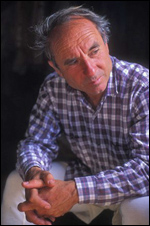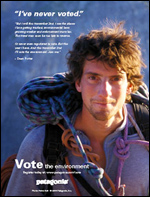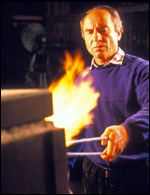Yvon Chouinard, world-class mountaineer, diehard surfer, obsessive fly fisher — oh yes, and founder and owner of Patagonia, Inc. — is as famous for his brio and gutsy outdoorsmanship as he is for his visionary business strategy. A Maine-born blacksmith, Chouinard has built Patagonia, a purveyor of top-quality outdoor goods, into a $230 million company without taking it public. Now in his mid 60s, he has for decades maintained a tireless my-way-or-the-highway attitude toward corporate America that has helped him nudge both colleagues and competitors in the direction of sustainability.

Yvon contemplates the fate of the planet.
Photo: Courtesy of Rick Ridgeway.
Patagonia was the first major retail company to switch all its cotton clothing over to organic, the first to make fleece from recycled soda-pop bottles, and the first to pledge 1 percent of its annual sales to grassroots environmental organizations. It has since touched off a trend that has big-name brands such as the Gap, Levi’s, Nike, and Timberland incorporating organic materials into their products and taking steps to minimize environmental harm. Of course, Patagonia is not entirely free of environmental fault. For one, the multinational company does much of its manufacturing overseas, and therefore must burn a fair amount of fuel to transport its materials and products around the globe.
But in the past several months, Patagonia has scored another notable first — launching the half-a-million-dollar Vote the Environment project to rally outdoor enthusiasts to the polls on Nov. 2. Chouinard spoke with Grist from his Patagonia headquarters in Ventura, Calif., about the presidential campaign, the challenges of pushing a business toward sustainability, why he’s more powerful than Bill Ford, and whether the planet is toast.
What motivated you to launch Patagonia’s Vote the Environment campaign?
Well, I was talking to Jesus last night [laughter] and He told me that everybody’s got it all wrong — that He really doesn’t want us to drill in the Arctic National Wildlife Refuge for oil, that we’re screwing everything up and we need to live a more examined life.
You’ve got a direct line to Jesus! What else did He say?
Well, He doesn’t talk to me very often — He was pretty brief.
You know, I’m just so disappointed that there’s nobody talking about the environment. Even though the Pentagon itself has come out and said that one of the biggest threats to American security is global warming. You listen to these [presidential] debates — they’re so stupid they’re unbelievable. The questions are stupid and the answers are stupid and nobody’s talking about the massive environmental problems we’re facing, whether it’s Bush or Kerry. It’s a sad deal. I want the environment to be a much bigger part of the political process. It only occupies 5 percent of the political agenda. Five percent! And to me it really is the bottom line.

A Vote the Environment ad.
Image: www.patagonia.com
Let’s get back to the details of the Vote the Environment campaign. I know the mission is to inspire outdoor enthusiasts to get out there and vote. How are you recruiting voters?
We’re helping voters register online and at our retail stores and asking them to make the environment their No. 1 priority. We’re not telling anybody how to vote.
Why aren’t you calling it the Vote Against Bush campaign, given that Bush is widely criticized as having the worst environmental record in history while Kerry’s environmental record is widely applauded?
Legally we can’t — corporations are supposed to stay out of the endorsement game. And for me, all that matters is really to tell people to look at each candidate’s environmental record and decide for themselves.
Can you talk about your own opinions about the candidates?
Not in this context — I’m a representative of Patagonia. They’ll nail me. [Laughter.]
But if anyone took even one minute to try and figure out which presidential candidate represents the environmental vote, it would be obvious who that is, wouldn’t it?
Yes, but it’s not just the presidential candidates — there are a lot of people who are running for Congress and the Senate and city council races and all kinds of stuff. And I’m saying look at their environmental records because it’s more important than anything else they say or do.
More important than the war, health care, education, everything?
Yes, in that it’s deeply connected to almost every one of those issues. I’m sick and tired of a society — I’m not talking about politics, I’m talking about a society — that is only dealing with symptoms of a problem and not the root cause. Our health-care problems are deeply connected to the environment. Consider breast cancer — you’ve got one in eight American women who are going to get breast cancer, that’s up from one out of 30 right after World War II, so there’s got to be an environmental cause to it. And yet only 3 percent of cancer research funding goes to trying to find the environmental causes. They’re trying to find treatments so they can make money off of it. The same thing goes for our so-called War on Terror. We’re not looking at the root cause of our conflict with the Middle East, resource dependency; we’re treating the symptoms.
I find that people concerned about the environment tend to be a lot more honest than people who aren’t. I think you can trust them. If you are voting for a congressman who has a really good voting record on the environment and the other guy who’s got a 10 percent [voting record], let me tell you I think that 10 percent guy is probably going to get indicted for something pretty soon.
What kind of feedback have you gotten from your customers about this campaign?
We’ve gotten hundreds of email responses on the campaign and more than 50 percent aren’t happy. I got lots of letters back from our customers really angry at us for getting political and telling them, they think, what to do.
I have one of the letters right here: “We are given the gift of our land by God in which to have dominion. That means to use and to a degree pollute. We are also called by God not to worship idols. The notion of a largely untouched pristine environment has become a quasi-religious idol for many. Hence with regard to environmentalism we have a distorted hubris, even dark influence.”
That guy must be talking to a different Jesus than the one you’re talking to! Is it alarming to discover that so many of your customers are anti-environmentalism?
It’s surprising, not alarming. I couldn’t care less. I could get 10,000 letters saying “Take me off your mailing list” and it wouldn’t bother me. If you’re not getting those letters, you’re not trying hard enough. That’s the way I see it.
What they don’t realize is that I’m not in the business to make clothes. I’m not in the business to make more money for myself, for Christ’s sake. This is the reason Patagonia exists — to put into action the recommendations I read about in books to avoid environmental collapse. That’s the reason I’m in business — to try to clean up our own act, and try to influence other companies to do the right thing, and try to influence our customers to do the right thing. So we’re not going to change. They can go buy from somewhere else if they don’t like it.
What will be the effect of the Vote the Environment campaign on your sales?
It’s already having a huge effect on the good side. We’re getting so much publicity off of it, a lot of editorials because we’ve taken a leadership position. Magazines have given us free ads. We can’t tell exactly how it’s affecting our sales yet in terms of numbers — it’s too early — but we do know it’s having an effect on registration. My estimate so far is that we’re going to get 100,000 people to register that have never voted before.
That’s enough to tip the election if you pull in pro-environment votes in the right swing states.
That’s new voters. We’re not going to change anybody’s mind who’s already made up their mind. But something like 20 percent of single women have never voted. That’s a huge constituency.
Your Vote the Environment campaign is applying the same marketing strategies to politics as Patagonia does to sell its products. Could the political world stand to learn some marketing savvy from the corporate world?
Yeah. When I look at how these guys are marketing themselves, the politicians, I’m thinking, Oh my God! Oh man, this is pathetic! You see Kerry out there with a coat, tie, and a starched shirt giving a speech to a bunch of autoworkers and you think, Oh my God, who dressed this guy? All Kerry has to do is go bass fishing and go to NASCAR races to loosen up his image.
What do you think are the environmental problems that the next president should be most concerned about?
Well, I’m a real pessimist. I think as a society we’re toast, to tell you the truth. I don’t know whether it’s going to be running out of water or topsoil, or disease, or endless wars being fought over resources. The Israelis are never going to give up the West Bank — that’s where all the water is. It’s all about resources, it’s all about territory, and it’s going to be a lot of gnashing of teeth. And any one of these things could be deadly serious, or it could happen all at once. And when you talk about the economy, the economy is so shaky because it’s based on all of us just consuming and discarding endlessly non-renewable resources and you can’t do that forever. There’s good reason for people to feel insecure.
Do you think that corporate leaders who are in business to make money simply can’t take a stand on any controversial causes because it might hurt their bottom line?
First of all, if they’re a public company they can’t do anything — they’re beholden to their shareholders. Patagonia is a private company, and the sole stockholders are me and my wife, so we can do anything we want. But if you’re CEO of a public company, the board of directors tells you what to do, and the stockholders tell the board of directors what to do, so there’s no way you can take a stance on anything controversial. Bill Ford says he’s an environmentalist, so deep down in his heart I’m sure he believes he shouldn’t be making SUVs, period. He shouldn’t allow the stockholders to tell him what to do. But he can’t do it. He has no power. I have way more power than Bill Ford does.
Who are some corporate leaders that you admire?
To tell you the truth, I am so out of contact with corporate America that I can’t say. I don’t hang out with businessmen and CEOs. I hang out with surfers and dirtballs. I’m completely out of it.
There are some companies out there that are doing some things like Stonyfield Farm, Ben & Jerry’s, Working Assets — you know, the usual — but then in some cases they’re owned by a huge corporation. I don’t know what they do really deep down. I don’t know whether they’re cooking the books like every other public corporation or not. I do think that Toyota as a company does the same thing we try to do by following the Socratic method, which is that you find your way to the solution of a problem by asking a lot of questions. They ask themselves the “5 whys” to reach their goals, which in my opinion builds excellence.
Can you describe your Socratic process when you decided to take Patagonia in a sustainable direction?
It was back in 1990 or so and we were growing the company by 40 to 50 percent a year and we were doing it by all the textbook business ways — adding more dealers, adding more products, building stores. Growing it like the American dream, you know — grow, grow, grow. And one year we predicted 40 to 50 percent growth and there was a recession and all the sudden we only grew 20 percent. And at the same time, our bank was going belly-up and we had cash-flow problems and it went to absolute hell. And I had been the person who had never bought anything on credit in all my life. I always paid cash for everything, and to have to call someone and say, “I’m sorry, I can’t pay my bills this month,” was killing me. And I realized that I was on the same track as society was — endless growth for the sake of growth.
That’s when I decided to put the brakes on and decided to grow at a more natural rate — which basically means that only when our customers want something do we make more, but we don’t prime the pump. We don’t advertise on buses in inner cities to get gang kids to wear black down jackets. I basically want to make clothing for people who need it rather than for people who want it.
Sometime after that crisis in the early ’90s, we started an environmental-assessment program where we looked at all our processes and all our materials and fibers and dyes and asked the question: Is this toxic? Is there a better way to do it? We decided to lead an examined life as a company.
What was the most cumbersome change that you had to make?
Switching over to organically grown cotton was a really big deal. Once I found out that cotton was the most damaging fiber that we could make clothing out of, I gave the company 18 months to completely get out of making any product with industrially grown cotton.
But you can’t just call the fabric supplier and say, “Give me 10,000 yards of organic shirting.” We had to revolutionize the industry. We had to co-sign loans for farmers because if they went organic they couldn’t get a loan from the bank because the bank’s tied in with the chemical companies. We had to convince gins to clean their cotton gins and then process our stuff. We had to find the right mills. It was a really big process. But we’ve never made a single product using industrially grown cotton since then and it’s working out fantastic. It put us on a whole other level from our competitors.
And the bottom line is that every time I made the decision because it was the right thing to do, I’ve ended up making actually more money.
Even in the short term?
For the first year it was rough. The product cost us about 20 percent more, but we only raised our prices about 5 percent just to stay in business. And we had to drop a lot of products because we couldn’t switch over fast enough. But now it’s working out great. And we’re influencing lots of other companies to use organic cotton — Nike, Timberland, Mountain Equipment Co-op, prAna — and we tell them where to get it. Other mainstream brands like the Gap and Levi’s are also picking up on the trend. It helps us, it helps the farmers, and it helps the mills that have taken the risk with us to be profitable and to create a demand for organic cotton.

What innovative idea is Yvon forging now?
Photo: Courtesy of Rick Ridgeway.
Are there any sustainable measures that you want to implement but you can’t simply because your bottom line won’t allow it?
We’re not constrained by the bottom line at all. We’re constrained by the fact that some technologies don’t exist yet. Like we make a lot of products out of recycled soda-pop bottles — polyester and fleece. Well, those bottles have a carcinogenic heavy metal, antimony, and we are working with the mills to take the antimony out before they make the fiber. And down the line we will try to make some of our clothing out of synthetics that can be completely — and indefinitely — recycled into new products. But we can only go as fast as industry goes along with us.
Are there inevitable environmental tradeoffs to running a multinational company, given all the shipping and flying and energy-intensive transporting of goods?
It adds a certain complexity to your business, that’s for sure.
But doesn’t it also add substantial environmental burden? Would it even be feasible to manufacture your products from domestic sources?
No, impossible. I could make everything domestically, but I would be out of business so fast I would become a martyr. But we do our best to use transportation methods with the least environmental impact. By far the cheapest and least energy-intensive method of transportation is by boat, then comes trains, then comes trucks, then comes airplanes. Airplanes are so much more wasteful than anything else — there’s no comparison. A lot of companies air-freight everything in because of cash-flow problems — they can bring a whole shipment of something and have it from their factory to their warehouse in two to three days, and that really helps their cash-flow problems. But we don’t do any of that. We have everything sent by boat from our suppliers slowly to cut down on energy consumption.
We see an increasingly vast array of so-called green products — hybrid cars, organic produce, solar panels, recyclable jackets. But is it dangerous to send consumers the message that they can buy their way out of our environmental problems?
That’s a good question because, number one, there’s no such thing as sustainability. There are just levels of it. It’s a process, not a real goal. All you can do is work toward it. There’s no such thing as any sustainable economy. The only thing I know that’s even close to sustainable economic activity would be organic farming on a very small scale or hunting and gathering on a very small scale. And manufacturing, you end up with way more waste than you end up with finished product. It’s totally unsustainable. It’s just the way it is.
So at best, we can slow down our march toward obsolescence.
That’s the best we can do — slow it down. But thinking that we can buy our way out of it is totally bogus.
I read that your house is made completely of reused and recycled materials.
It’s fairly guilt-free. I basically built the whole house of recycled materials. Busted-up sidewalks for the walls. The roof tiles are reused. All the wood is reused. All the furniture is used. All except the plumbing and electrical. Because the walls are 28 inches thick, I don’t have to heat or cool it, and it’s fully solar-powered.

Yvon catches a wave.
Photo: Reprinted with permission of Patagonia, Inc.
You are also known to be an avid alpinist, angler, and surfer. Can you tell us how your outdoorsmanship feeds your professional philosophy?
I’ve spent a lifetime doing so-called risk type sports. I don’t call them extreme. Climbing is risky. Whitewater kayaking is risky. I think the one lesson you learn from that is that you don’t exceed your resources. You try to live life on the edge, because that’s when you get the most value — you’re really sticking your neck out, really working at optimum efficiency — but you don’t go over the edge because you die. And I think we’re over the edge with society. Right now we have the government we deserve. They are absolutely a reflection of who we have become.
In your own life, how do you avoid going over the edge?
In my own personal life, I’m trying to simplify everything, which is the hardest thing you can try to do. It’s so easy to complicate your life, it’s so hard to simplify it. Whether it’s eating more simple food and not consuming, just buying the things you need rather than the things you want. We’re constantly being pulled toward complexity rather than simplicity. And I think that’s really wrong. I fight that all the time. But it has to start with each and every one of us to make change in our lives. It’s up to each individual to lead an examined life.
I got a fortune cookie the other day that said: Simplicity is the natural result of profound thought.
That says it all.

